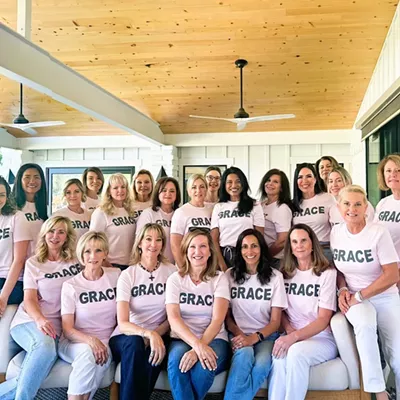A local bakery, Tilted Halos, is no ordinary dessert shop.
The new business provides transitional employment for people emerging from incarceration and substance abuse rehabilitation.
Tilted Halos is a novel venture in another sense, too. The shop sells treats that are both vegan and gluten-free. The baked goods are made with coconut flour, chickpea flour or a rice-flour blend.
Mariel Montiel, owner of Tilted Halos, said there weren't enough vegan and gluten-free options that actually tasted like a traditional treat.
Montiel has participated in rehabilitation treatment for substance abuse herself, and is currently in healthy recovery. She plans to participate in her current 12-step program for life. She came up with the idea of providing transitional employment after meeting many people who struggled to find jobs.
She said employing people coming out of recovery and incarceration not only fosters a transparent workplace, but also provides them with skills and a much-needed boost in diminished self-esteem.
"Nobody would have to hide their backgrounds and I find that a lot of people have to hide that they have a parole officer," Montiel said. "Having a parole officer show up to your work can be embarrassing if your employer doesn't know about it. This is just somewhere that people could be open."
Montiel doesn't have any felony convictions, but she said getting clean without dealing with a criminal record was tough enough and she imagines the process is more frustrating for people with those records.
Jeff, who has asked us to not use his real name since his current employer is unaware of his history, worked for Montiel for about six months after he served two years for knowingly purchasing a stolen truck, but said that wasn't his only past infraction. He said all of his struggles with the criminal justice system stemmed from addiction issues.
Jeff has restaurant management history, and he helped Montiel create new promotional and marketing ideas while an employee. He said he would also help her create cost-benefit analyses, bake and package the products.
"I really can't even describe how inspirational it was to have someone that just cared and was open," Jeff said.
Jeff struggled with low-self esteem once he started looking for another job outside of Tilted Halos because it almost always led to disappointment. He did land a job in restaurant management, but said he "got lucky" because his employer did not run a background check.
"We all have a past, and there's a lot of good in every individual no matter what they've been through," Jeff said. "Programs like this that can highlight your assets versus your faults are hugely beneficial to the community and to many people. I feel like life is normal again."
Almost exactly two years ago, Ward 5 Councilman Richard Fimbres brought the Ban the Box ordinance motion forward. With the mayor and council's support the ordinance removed the criminal history question on the initial employment application for City of Tucson jobs. It did not remove background checks for jobs in public safety, the handling of money or ones involved interacting with more vulnerable groups, such as children. Fimbres said the goal was to decrease recidivism and integrate people back into the society more successfully.
"We're hoping that the private sector will also look at our example and mend some of their ordinances," Fimbres said.
In a 2009 study by the National Institute of Justice, researchers Devah Pager and Bruce Western found having a criminal record cut the chances of employment after incarceration by about half for men, and the chances were even slimmer for African American men.
According to the Pima County's website for the Safety and Justice Challenge grant, from 2011 to 2014, more than 80 percent of inmates in Pima County were still in pretrial status. The largest group of pretrial detainees were incarcerated for failure to appear at court for mostly misdemeanor charges.
Andy Silverman is a UA law professor and the director of the Civil Rights Restoration Clinic. The clinic allows UA law students to prepare pleadings and brief court hearings for people previously convicted of criminal offenses and who are struggling to reenter society. Silverman said the clinic is involved with about 100 cases a year, but not all of them get as far as filing a motion.
"I would say that most of the people that contact us for help do so because they have a problem in getting a job," Silverman said. "It's probably the biggest barrier that people with criminal convictions face because most obviously need jobs and there's just lots of employers still who will not hire people who have a conviction no matter what it is and no matter what the job is."
State Senator Martin Quezada originally created SB 1127, a state Ban-the-Box ordinance which never received a hearing. Quezada amended the language of his original bill and added it to SB 1069.
On Feb. 23, Quezada said the Ban the Box addition to SB 1069 was amended back out of the larger bill.
One objection discussed in the Legislature by others about the Ban the Box amendment was that it wastes employers' time to interview a potential employee and then still run a background check afterward and find a criminal record, Quezada said, adding that another objection from other members was that the amendment would waste state agencies' money because they were interviewing people they ultimately weren't going to hire. He said other members also argued that people with criminal histories don't belong in state government jobs.
Quezada agreed that the amendment would make interview processes take longer, but employers already don't hire every single candidate at the end of the process anyway, whether or not the interviewees have criminal records.
"This could actually save our state a lot of money," Quezada said. "We might be paying people to go through an interview process, but at the end of the day if they end up hiring some of these individuals, those are people that are going to want to keep that job."
People with criminal records will likely be great employees because they will appreciate the opportunity and will work harder not to be replaced or fired, he said.
"Once individuals pay their debt to society—they've paid their debt," Quezada said. "I think that's the problem that we have now, and why people keep going back into the criminal justice system – because we haven't figured out a way to allow them to reestablish their lives again."
Tilted Halos is currently a home-based establishment with pick-up and delivery options available, and Montiel regularly sells the products at farmers' markets like the Santa Cruz Farmers' Market at the Mercado San Agustín. She dreams of opening up a storefront as soon as possible with a team of employees.








